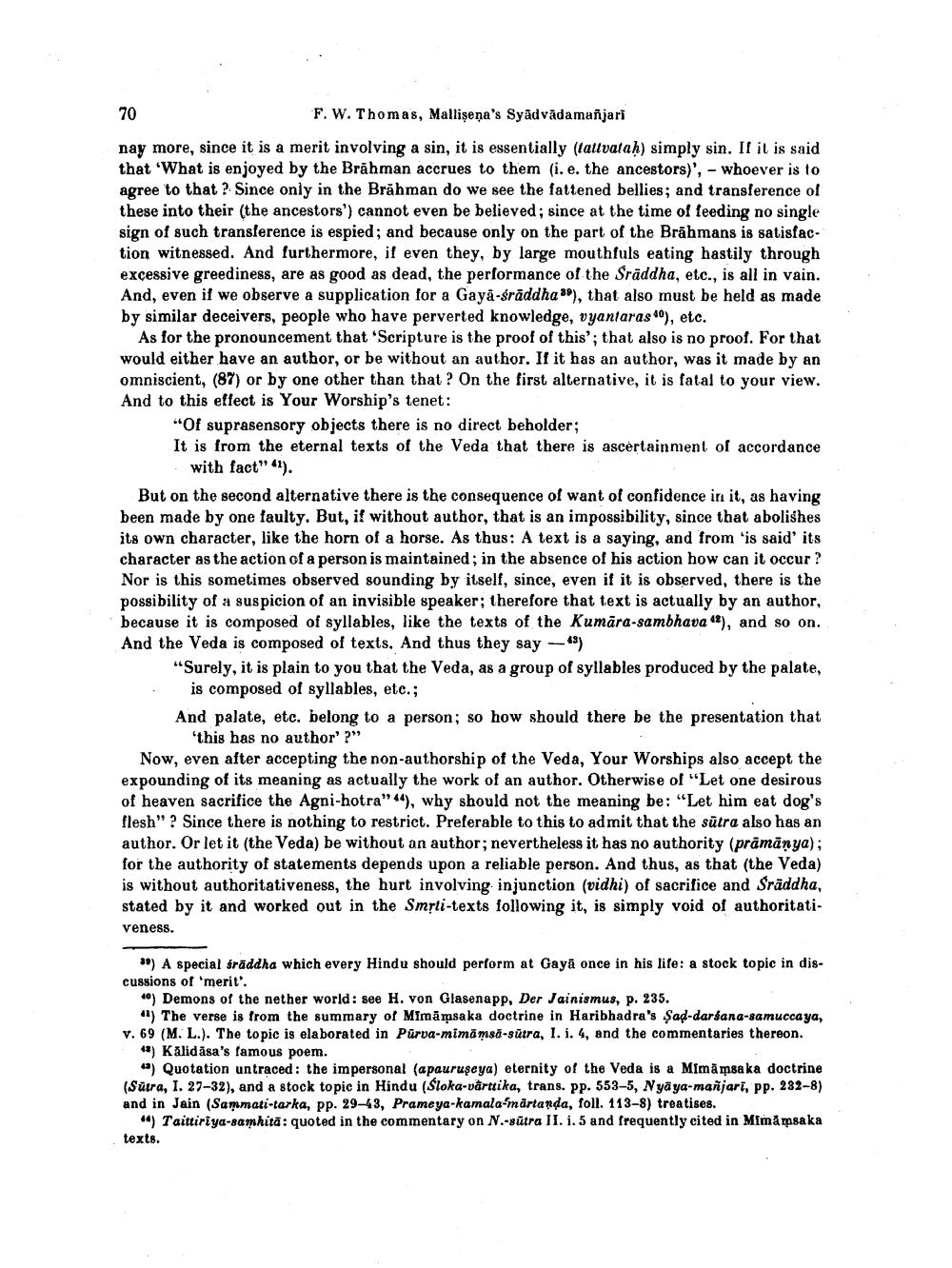________________
70
F. W. Thomas, Mallişeņa's Syadvadamañjari
nay more, since it is a merit involving a sin, it is essentially (tattvatah) simply sin. If it is said that "What is enjoyed by the Brāhman accrues to them (i.e. the ancestors)', - whoever is to agree to that ? Since only in the Brāhman do we see the fattened bellies; and transference of these into their (the ancestors') cannot even be believed; since at the time of feeding no single sign of such transference is espied; and because only on the part of the Brāhmans is satisfaction witnessed. And furthermore, if even they, by large mouthfuls eating hastily through excessive greediness, are as good as dead, the performance of the Sraddha, etc., is all in vain. And, even if we observe a supplication for a Gaya-srāddha"), that also must be held as made by similar deceivers, people who have perverted knowledge, vyantaras "), etc.
As for the pronouncement that 'Scripture is the proof of this'; that also is no proof. For that would either have an author, or be without an author. If it has an author, was it made by an omniscient, (87) or by one other than that? On the first alternative, it is fatal to your view. And to this effect is Your Worship's tenet:
"Of suprasensory objects there is no direct beholder; It is from the eternal texts of the Veda that there is ascertainment of accordance
with fact" ). But on the second alternative there is the consequence of want of confidence in it, as having been made by one faulty. But, if without author, that is an impossibility, since that abolishes its own character, like the horn of a horse. As thus: A text is a saying, and from 'is said its character as the action of a person is maintained; in the absence of his action how can it occur? Nor is this sometimes observed sounding by itself, since, even if it is observed, there is the possibility of a suspicion of an invisible speaker; therefore that text is actually by an author, because it is composed of syllables, like the texts of the Kumāra-sambhava“), and so on. And the Veda is composed of texts. And thus they say - 48)
"Surely, it is plain to you that the Veda, as a group of syllables produced by the palate,
is composed of syllables, etc.; And palate, etc. belong to a person; so how should there be the presentation that
"this has no author'?" Now, even after accepting the non-authorship of the Veda, Your Worships also accept the expounding of its meaning as actually the work of an author. Otherwise of "Let one desirous of heaven sacrifice the Agni-hotra" 44), why should not the meaning be: "Let him eat dog's flesh" ? Since there is nothing to restrict. Preferable to this to admit that the sutra also has an author. Or let it (the Veda) be without an author; nevertheless it has no authority (pramanya); for the authority of statements depends upon a reliable person. And thus, as that (the Veda) is without authoritativeness, the hurt involving injunction (vidhi) of sacrifice and Sräddha, stated by it and worked out in the Smrti-texts following it, is simply void of authoritativeness.
**) A special srāddha which every Hindu should perform at Gayā once in his life: a stock topic in discussions of merit'.
40) Demons of the nether world: see H. von Glasenapp, Der Jainismus, p. 235.
a) The verse is from the summary of Mimāmsaka doctrine in Haribhadra's Şad-darsana-samuccaya, V. 69 (M. L.). The topic is elaborated in Pūrva-mimõmso-sūtra, I. i. 4, and the commentaries thereon. -") Kalidāsa's famous poem.
3) Quotation untraced: the impersonal (apauruşeya) eternity of the Veda is a Mimāmsaka doctrine (Sūtra, I. 27-32), and a stock topic in Hindu (Sloka-várttika, trans. pp. 553-5, Nyāya-mañjari, pp. 232-8) and in Jain (Sammati-tarka, pp. 29-43, Prameya-kamala-martanda, foll. 113-8) treatises.
") Taittiriya-samhita: quoted in the commentary on N.-sutra II. 1.5 and frequently cited in Mimamsaka texts.




